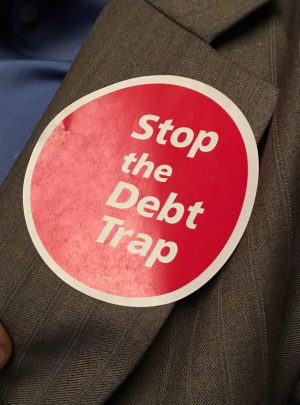Consumers, Payday Lending Employees Face Off On Proposed Short-Term Lending Rules Image courtesy of frankieleon
Consumer advocates, regulators, and representatives of the small-dollar lending industry descended upon Kansas City on Thursday to discuss the Consumer Financial Protection Bureau’s long-awaited proposed rules intended to rein in predatory lending. Today’s field hearing wasn’t just panelists debating whether payday loans — and similar products like auto-title and installment loans — are harmful or helped consumers in need. It also presented an opportunity for everyday consumers to share their stories and experiences with these controversial products.
From providing a needed lifeline that morphed into a career to those who lost their homes and vehicles after falling behind on high-cost loans, the contrasting views provided a look into what the small-dollar lending industry means to consumers.
Employees of several payday and auto-title lending operations in Missouri shared their concern that if the CFPB’s rule goes into effect they will be out of a job.
The owner of a family owned lender told the CFPB that she disagrees with the idea that store won’t close with the new regulations.
“I’ve seen in my community,” she said. “The proposed rules are going to shut down the little guys. There is no way you can do a one-size-fits-all for all of us.”
The woman, who is in charge of ensuring the company meets regulations, admitted that there are horror stories associated with payday lending, but that there is “also so much good that we have done.”
Another employee of a small-dollar lender recalled how she took out loans when she was younger.
“I was a customer years ago,” she says. “They helped me get on my feet and now I work there. I help people.”
The woman’s manager warned the CFPB that if rules take effect there will be thousands of people out of a job.
“Who is going to take care of my family when I don’t have a job,” she asked. “Will charities step in and pay electric bills when I can’t pay? No. I am a responsible lender, I take care of my employees and customers.”
On the other side of the argument, several former borrowers and advocates shared stories of how the short-term loans they took out create a revolving debt-trap they weren’t able to get out of without additional help.
“I got into the trap because of bad choices,” one woman said. “I have a job and should have been able to pay it back. But had to roll it over twice” because of unforeseen circumstances.
The woman, who lost her job, home, and vehicle, says she was only able to dig herself out of debt with the help of Catholic Charities of Kansas City, which paid off her debt and then provided her with a loan at a 6% interest rate through a partnership with a local financial institution.
Kevin Williams, the director for Catholic Charities of Kansas City, told the CFPB that his organization has worked over the past year to help consumers currently trapped in the payday lending cycle of debt.
“We do this because the payday industry obstructs the path to self-sufficiency,” he said.
Williams sentiments were echoed during a panel potion of the CFPB’s field hearing, when advocates and faith leaders described specific incidents in which their constituents were enticed by the small-dollar lending industry.

Stop the Debt Trap, a coalition of 500 organizations, presented the CFPB a petition of 50,000 signatures in favor of reform rules.
Rev. Dr. Anita Gould, Executive Director, Missouri Faith Voices and Quinn Chapel AME in Jefferson City, MO, told the story of a woman who had taken out five payday loans, each designed to pay off the last.
“That can not happen,” Gould said. “There needs to be a limit, and six is way too many.”
In another example, Gould addressed the CFPB’s proposed collection protection rule, which would limit the number of times lenders can debit a borrower’s account in order to receive a payment.
“One constituent had a payday lender attempt 15 debits in one day,” she recalled, noting that the overdraft fees incurred increased the woman’s bill by thousands of dollars.
“Payday lending is like an undiagnosed cancer, affecting our and the community’s lives,” she said. “These rules are certainly a step in the right direction. There should be no exceptions. We must stop the debt trap.”
In one case an advocate shared information on a recent lawsuit filed against a payday lender after it took action against a woman who had borrowed $80.
The lender was awarded a $2,000 default judgment against the borrower. The company then garnished her wages to the tune of $5,000. However, the remaining balance on her loan was still $19,000.
“I have not heard anyone justify this,” the advocate said calling for strong, comprehensive rules to be enacted.
Joining the chorus of advocates applauding the CFPB’s steps to rein in predatory lending, our colleagues at Consumers Union described the rules as a way to help protect consumers from drowning in debt from payday loans and other forms of high cost credit.
“For too long, payday and other high-cost lenders have trapped millions of Americans each year into troubling cycles of debt,” Suzanne Martindale, staff attorney for Consumers Union, said in a statement.
As with other advocates, however, CU warns that the proposal contain potential loopholes.
“The proposal is strong but contains exemptions that may still permit risky lending practices,” Martindale said, calling on the CFPB to finalize rules that “require sensible underwriting, promote fair pricing, and include safeguards to prevent repeat borrowing for all short-term and long-term loan products.”
Want more consumer news? Visit our parent organization, Consumer Reports, for the latest on scams, recalls, and other consumer issues.


